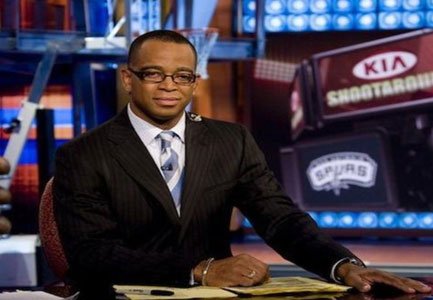There’s little question that Stuart Scott “was as cool as the other side of the pillow,” and among the best at his craft.
To put it in Scott’s own words, when it came to describing the highlights of the day in the sports world, the famed ESPN anchor “must [have been] the bus driver because he was taking [everyone else] to school.”
Scott died on Sunday, January 4, 2015, after a long but heroic bout with cancer. He was 49.
In a moving tribute posted on ESPN.com, Steve Wulf noted that among the new features of the ESPN studio in Connecticut, there’s a wall of catchphrases made famous by on-air talent over the years. An amazing nine of them belong to Scott, from his signature “Boo-Yah!” to “As cool as the other side of the pillow,” to “He must be the bus driver cuz he was takin’ him to school.”
Wulf said Scott inspired his colleagues with his sheer talent, his work ethic and his devotion to his daughters, Taelor, 19; and Sydni, 15. He defied convention and criticism to help bring ESPN into a new century.
“He spoke to the very athletes he was talking about with flair and a style that ESPN president John Skipper said changed everything,” Wulf said.
ESPN reporter J.A. Adande waxed poetically about what he called the greatness of Scott.
“The last time I saw Stuart in person was the night in July when he owned the stage at the ESPYS with that moving speech after he accepted the Jimmy V Award. We crossed paths later that night as he left a party. I congratulated him and gave him a pat on the arm,” Adande said. “He was so frail that his arm felt hollow. His entire body seemed hollow, like his essence had been scooped out of him. He gave me an atypically tepid reply and kept moving. It was as if he had used up all his energy on the speech. And if you peered between the lines of what he had said on stage, you knew he had drained all of his reserve fuel in the fight against cancer and was ready for the inevitable conclusion.”
Adande says he feared Scott had been drained a few years ago when he appeared at a Los Angeles Lakers basketball game with his daughters. Players kept breaking from the layup line to come over and talk to Scott and he kept explaining that he wasn’t there for work, that he’d just taken a trip to Los Angeles with his daughters.
“He had plenty more time, as it turned out. Not as long as any of us would have liked, but enough to work Monday Night Football games, enough to emcee the trophy presentation at the NBA Finals, enough to co-host the debut of the new Sports Center studio,” Adande said.
Another ESPN colleague, Jason Whitlock, said what he respected most about Scott “is how courageously he lived.”
Whitlock noted that Scott battled the cancer that ended his life as courageously as he battled the critics who failed to warm to his hip-hop influenced broadcast style.
“It takes courage and conviction to be different inside a large corporation. Stuart Scott didn’t want to sound like everyone else on television. He didn’t want to appeal to the same audience. He wanted to be unique, a voice for a generation marching to its own beat. Mission accomplished,” Whitlock said.
Born in Chicago, Scott grew up in North Carolina with two sisters and a brother. He attended the University of North Carolina and played on the school’s football team. He graduated in 1987 with a bachelor’s of arts degree in speech communication. Scott worked as a news reporter and weekend sports anchor in South Carolina before climbing the ranks and eventually landing at ESPN in 1993.
His death has not only bought tributes from his colleagues, but athletes and President Barack Obama have paid homage.
“I will miss Stuart Scott,” Obama said. “Over the years, he entertained us, and in the end, he inspired us with courage and love.”
Cleveland Cavaliers star LeBron James said he couldn’t believe Scott had died and golfer Tiger Woods said Scott wasn’t covering heroes and champions; it was the other way around.
“I’m thinking of my friend and his daughters,” Woods said.
